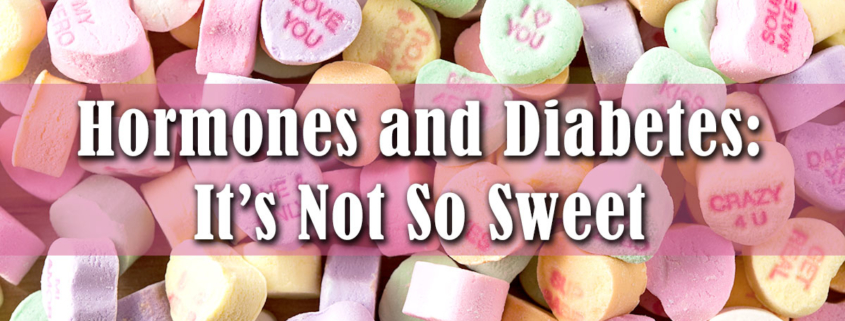Hormones and Diabetes: It’s Not So Sweet
Diabetes Basics
Did you know that the medical term for diabetes is actually “Diabetes Mellitus”? (Although you probably never hear it called that.) Diabetes affects approximately 30.3 million people (9.4% of the population) in the United States, (Tom Hanks, Nick Jonas and Halle Berry to name a few) while another estimated 84.1 million people have prediabetes and don’t know it. What you probably know is that it has something to do with sugar. To put it simply, diabetes is a chronic condition in which the body does not produce enough of the hormone insulin, resulting in high levels of the sugar “glucose” in the bloodstream.
Every Type is Pretty Terrible
There are two main types of diabetes: type 1 and type 2. Both types of diabetes are lifelong diseases that affect the way your body regulates blood sugar, or glucose. Glucose is the fuel that feeds your body’s cells, but to enter your cells it needs a key. Insulin is that key. People with type 1 diabetes (often known as juvenile diabetes) don’t produce insulin. You can think of it as not having a key. People with type 2 diabetes don’t respond to insulin as well as they should and later in the disease often don’t make enough insulin. You can think of this as having a broken key. Of the two, type 1 is the most severe.
When Hormones Have Their Way
Hormone imbalances definitely influence blood sugar levels. To better understand how hormones affect diabetes, it is important to identify which hormones can impact those levels in the blood. Insulin is the hormone that affects blood sugar levels the most, but it’s not the only one. Glucagon, Amylin, Epinephrine, Cortisol and Growth Hormone are others that are best left to medical minds. Let’s just say when it comes to diabetes, unbalanced, they’re “bad”. This, we can all understand.
Some Serious Stuff Here
Many people with diabetes often “poo-poo” it, not believing it can really do that much damage. But consider just some of the symptoms and health-related problems:
- Increased thirst and urination
- Nerve pain
- Nausea
- Vomiting
- Blurred vision
- Hunger
- Weight loss or gain
- Fatigue
- Dry mouth
- Depression
- Slow-healing wounds, cuts, or sores
- Itching skin
- Increased susceptibility to infections
- Heart and blood vessel disease
- Kidney disease
Still think controlling it isn’t something to think seriously about?
Eat This Up
The first thing people think about when it comes to diabetes and diet, is deprivation. No this, no that, and absolutely, positively, never-ever anything sweet. Not so. It’s just all about portion. That box of Valentine candy? Have a small piece or two, just don’t devour the whole thing or dig into a 5-lb chocolate heart. (Cupid won’t die if you don’t). A diet for diabetics is a sensible, healthy diet for anyone; fruits, vegetables, whole grains, lean protein and heart-healthy fats. It’s about cutting back on sodium and processed foods. And really cutting back on carbs which are most easily broken down into sugar. What are a few examples of things you should you totally try to avoid?
- Frosting (Sorry, but you can ‘t get caught up in the cupcake craze)
- Bagels
- Soda (sugar-free is fine)
- Sugary cereals- (Fruit Loops can really send your blood sugar in loops)
- Stick margarine
- Jarred tomato sauce- (Sure, it’s easy, but…Prego is a no-go)
- Bacon (No more “Bs” in your BLTs)
- Maraschino cherries (And the sugar-laden cocktails you love them in)
- Soy sauce
- Smoothies (Just being green, doesn’t make them healthy)
- Vanilla cappuccino with whipped cream and hazelnut drizzle (Or any other Starbucks specialty where tons of sugar make them so special.)
- The devilish duos of anything breaded and fried (bye-bye chicken McNuggets)
- Fatty red meat (liverwurst’s the worst)
- Hot dogs
It’s All in the Balance
Before you go bonkers over diabetes, you have to remember that it can be all about hormone imbalances. And imbalances, if treated correctly, by the right medical specialists, can be balanced. The place to start, is getting a good and accurate measure of your hormones, especially those that can contribute to diabetes. And in the Denver area, there’s no better place to do that than at Denver Hormone Health. Every one of the doctors that are at Denver Hormone Health are hormone specialists that know everything there is to know about hormones and getting them back in balance. Simple tests can tell them how they can help you if they determine you’re pre-diabetic or diabetic. Even if it turns out you’re not, they can see if something isn’t in balance with all the other hormones floating through your bloodstream. In any case, all they care about is getting you back to feeling your best. Call the experts at Denver Hormone Health now.
Diabetes doesn’t have to get you down.



